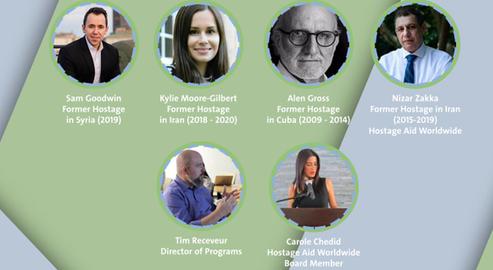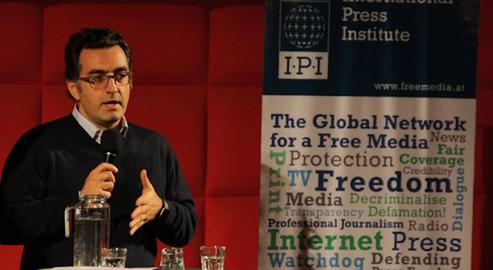In September 2015, the Lebanese-born IT expert Nizar Zakka travelled to Iran for a conference on the express invitation of the government. But in Tehran he was arrested, accused of "espionage" and ended up spending four miserable and unjustified years in prison.
Zakka and several other ex-hostages of the Islamic Republic have now set up an international organization, Hostage Aid Worldwide. On Thursday, March 4, the campaign was launched with an webinar attended by various guests, who discussed several aspects of state-sponsored hostage-taking in Iran and elsewhere. The event took place on the eve of possible talks between Iran and the United States about reviving the Joint Comprehensive Plan of Action (JCPOA).
***
In recent weeks the Biden administration has re-iterated its intention for the United States to re-join the JCPOA. But at the same time, a growing number of analysts, experts, human rights campaigners, ex-prisoners and the media have spoken of the need to address the issue of dual-national prisoners and hostage-taking in Iran.
American media outlets have repeatedly asked foreign policy officials in the Biden administration whether the release of hostages will be a precondition in the return talks. Secretary of State Anthony Blinken, as well as Jake Sullivan, the president's national security adviser, Rob Mali, the special envoy for Iran, and Wendy Sherman, the nominee for deputy secretary of state, have all had this question put to them. In an interview in late February, Sullivan revealed that the US had begun to communicate with Iran over the country's detention of American citizens.
Meanwhile, a new non-profit organization, Hostage Aid, hosted an online meeting on Thursday, March 4 to address various aspects of hostage-taking in the Islamic Republic of Iran and its relationship with the nuclear deal. Many of those in attendance had previously spent time in Iranian prisons, including from Barry Rosen, who was held for 444 days during the US Embassy hostage crisis in Tehran, Hostage Aid founder Nizar Zakka, British-Australian academic Kylie Moore-Gilbert, IranWire’s founder Maziar Bahari, Chinese-American historian Xiao Wang, and Iranian-American journalist Jason Rezaian. Richard Ratcliffe, whose wife Nazanin Zaghari-Ratcliffe is still in prison in Iran, also joined the discussion.
A Question of Priorities
One of the questions that has recently been raised in the US media, as well as in Thursday's roundtable discussion, was about how the release of American hostages in Iran could be prioritized amid a possible return to the JCPOA.
For his part, Xiyue Wang said he did not believe that a new agreement with Iran could stop the Islamic Republic from taking hostage. He was held in the country from 2016 to 2019 after traveling there for research shortly after the JCPOA was signed, and said he believed the original agreement was “partly responsible” for he and others being detained.
"I think the idea of the JCPOA in a large part was to encourage Iran to be part of the international community and a responsible actor in the civilized world," he said. “But as we have seen, the JCPOA has failed in that regard. The Iranian regime did not change its behavior; it kept on taking hostages at a higher rate after the January 2016 exchange.” He added that the release of frozen Iranian assets by the Obama administration had not been viewed as a gesture of goodwill, but rather as a “ransom”: “The Iranian regime explicitly and repeatedly stated that this money was a ransom.”
Jason Rezaian, who was held hostage in Evin Prison for 544 days until his release in January 2016 as part of a prisoner exchange with the US, said he agreed. "I don’t think a return to the JCPOA is the answer to putting an end to Iran’s hostage-taking... I think it’s going to continue to be a problem until the Iranian regime has a feeling that it might not be worth it for them to do this anymore.”
National and international Laws Against Hostage-Taking
There are several international conventions in place that aim to combat and criminalize hostage-taking by states. From time to time, new national and international decrees are added to this effort. In mid-February 2021 the Canadian government launched the Declaration Against Arbitrary Detention in State-to-State Relations, which has since been signed by a large number of countries. Three weeks ago, US Secretary of State Anthony Blinken also backed the declaration.
Last summer the US Senate also passed the Robert Levinson Hostage Recovery and Hostage-Taking Accountability Act, which seeks to recover American hostages and hold the perpetrators accountable. Robert Levinson was an FBI agent who is known for being the longest-serving American hostage in Iran after disappearing on Kish Island in March 2007. He was declared presumed dead last spring.
His daughter, Sarah, Robert Levinson's daughter, spoke on Thursday about the family’s difficulties and lack of direction in the early period after her father's disappearance. “My family had no playbook for how to do this,” she said. “There was no blueprint for how to operate, who to trust or who to speak to.” This law, she said, was an important part of her father’s legacy in helping families to navigate the challenge and putting pressure on hostage-taking states.
Ted Deutsch, a member of the US House of Representatives who was a supporter of the Levinson Act in Congress, said on Thursday's meeting that now that the Biden administration is deciding to revive the JCPOA, he would try to make the release of hostages a top priority.
Ways to Deal with Government Hostage-Taking
The participants in Thursday's meeting all stressed the need for cooperation between governments in combating hostage-taking, especially state-sponsored hostage-taking. Maziar Bahari, the founder and editor-in-chief of IranWire, said that in the first instance governments should issue clear and explicit advice and warnings to citizens planning a trip to Iran.
"Many of our friends who were released or are still incarcerated in Iran went because of the euphoric atmosphere after the signing of the JCPOA,” he said. “If the American government reaches any new deal with Iran, they should give clear advice to citizens that the nuclear deal is not a panacea. It’s not going to change the nature of the Iranian government and they have to be careful.”
Bahari also said the government needed to advise companies and businesses making new deals with Iran. “For the Iranian government,” he said, “any person with a foreign passport is a commodity that can be exchanged for something else.” The stories of previous dual-nationals held hostage in Iran, he said, should be widely-reported so future would-be travellers to Iran will be informed.
Kylie Moore-Gilbert, a British-Australian scholar who spent more than two years in Iranian prisons before being released last November, is also a co-founding member of Hostage Aid Worldwide. “We believe it is important to push for governments to collaborate in finding strategies to end the growing phenomenon of hostage-taking and arbitrary detention for diplomatic leverage," she said in a short message.
"No journalist, academic, tourist or businessperson should be at risk of arrest simply because of their nationality. Governments are increasingly being forced to negotiate for the lives of their innocent citizens to meet the demands of state-based hostage-takers, often paying a heavy price in exchange. We call on governments to take action to stop the hostage-taking business model.”
Thursday's program was hosted by Hostage Aid Worldwide in collaboration with the James Foley Foundation, which advocates for American hostages held abroad and supports conflict journalists around the world. James Foley was a news photographer who was abducted and murdered by ISIS in Syria in 2014. His mother, Diane Foley, is the director of the foundation, and also spoke at Thursday’s meeting, called on the Biden administration to prioritize the issue of releasing hostages in Iran.
Related coverage:
Nazanin's Husband: Hostage-Taking by Iran Must End
No-one is a Guest in Iran: US Embassy Hostage Crisis Survivor
The Islamic Republic is Addicted to Hostage-Taking as a Diplomatic Strategy
Austrian MP Accuses Iran of Systematic Hostage-Taking of European Citizens
The Algiers Accords at 40: Iran Continues to Take Hostages Decades After Historic Agreement
UN Special Rapporteur Issues Damning Report on the State of Human Rights in Iran
visit the accountability section
In this section of Iran Wire, you can contact the officials and launch your campaign for various problems



























comments